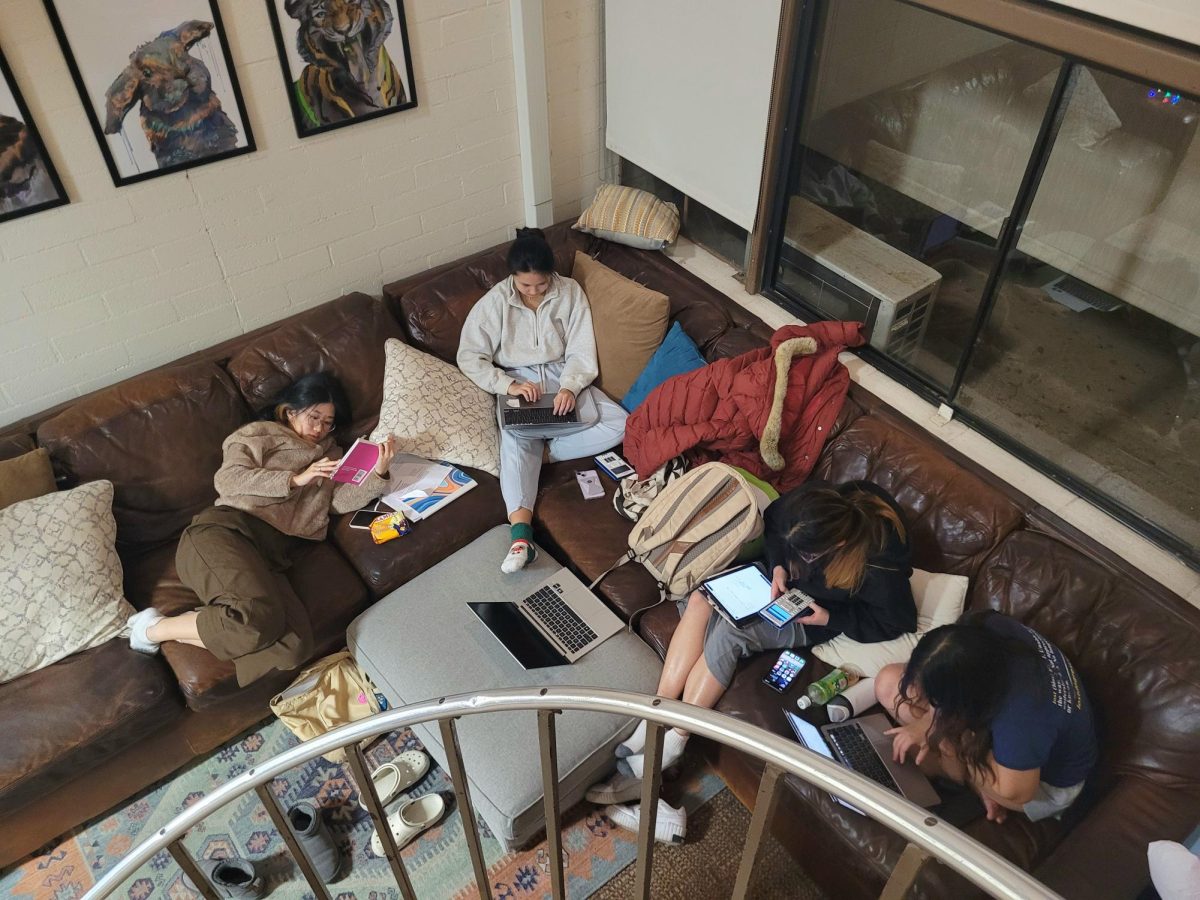I open my eyes as startling sounds come from my phone. I think to myself, pull yourself together, you just need to get through today.
As I repeat these phrases in my head, I pull all the energy I can possibly grasp to lift myself out of bed. Instantly, I run to the sink, turn on the freezing cold water, and splash my face.
I look up at the mirror, reflecting the dark eyebags circling the underparts of my eyes. I think to myself again, you can do this, just one step at a time, as I mentally prepare to continue with my daily academic morning routine.
Eight A.M. Wednesday morning, I mentally prepare myself for the day as a way to motivate myself to wake up. I sometimes have little energy in the morning due to a long day the night before. I do not consider myself to be sleep-deprived by choice, it is often due to the several academic commitments I had to complete the night before.
According to the CDC, Teenagers from the age of 13-18 should be getting 8-10 hours of sleep daily.
From an in-house spot check survey data conducted on October 6th, 2022, students were asked how many hours of sleep they were getting per weeknight. 11.3% of students reported obtaining less than 5 hours of sleep, 46.3% reported 5-7 hours, 38.4% reported 7-8 hours, and 3.9% reported getting more than 8 hours of sleep.
“I am very sleep deprived because I usually get to finish my homework at 1 or 2 A.M., and the next day, I have to get up at 6:30 to 7 A.M.,”said Michel Fountain (‘26). “I have a lot of homework and sports too.”
Not getting the proper rest daily can have a major negative effect on multiple different factors in your daily life. A study indicated by Stanford Medicine, highlights the dangers of sleep deprivation among teenagers in physical and mental health. These include a lack of physical and mental energy, anxiety, depression, and inability to concentrate.
“I think issues around sleep deprivation are trending on campus right now,” said Ning Zheng, counselor. “In the health center, we keep seeing several students whose sleep schedule is messed up and are not sure how to fix their schedule.”
At Webb, a student’s schedule is often packed with commitments, such as classes, leadership meetings, clubs, sports, extracurriculars, and much more. As a school known for its rigorous academics, it is no surprise that sleep deprivation can be found within the student body.
Regarding academic commitments, a set of guidelines for homework assigned per class was created by the academic council. This council consists of the department chairs, including Mr. Hatala, Director of Studies, college guidance, Dr. Dzula, Teaching/learning resources, Dr. Linsley, Director of Experimental Learning, and Mr. Coates, Technology resources.
Teachers were assigned to limit homework assignments to around 45 minutes for core and non-honor courses and 60 minutes for honors, AP (Advanced Placement), and Advanced Studies classes.
From the same in-house spot check survey data, students were asked to report the amount of time spent completing assignments.
9th and 10th graders reported that for their Humanities Courses, 3.3% of students reported spending less than 45 minutes, 22.2% of students reported spending 45 minutes to an hour, 28.8 % reported spending 1 to 1.5 hours, and 22.9% reported spending 2 or more hours on homework.
For 9th and 10th graders science courses, 44.7% reported spending less than 45 minutes, 25% reported spending 45 minutes to an hour, 5.9% reported spending 1 to 1.5 hours, and 1.3% reported spending 2 or more hours on assignments.
11th and 12th Graders reported that for Humanities Electives, 3.2-4.3% spend 45 minutes or less on homework assignments, 30.1-33.3% spend 45 minutes to an hour, 34.4-36.6 % spend 1-1.5 hours, and 3.5-12.9% spent 2 or more hours on homework.
For science electives in 11th-12th graders, 11.8-12.9% reported spending 45 minutes or less on homework assignments, 11.8-34.4% spend 45 minutes to an hour, 11.8-29% spend 1-1.5 hours, and 3.5-12.9% spend 2 or more hours on assignments.
As indicated by the data, there is a significant percentage of students who have been spending over the set guide amount of time for their course.
“I am sleep deprived because I have a lot of homework and tests to study for, and I am especially sleep deprived during summatives because I have so many all at once,” said Payton Delgado (‘25.)
Although many of these opinions have been expressed vocally, it feels as if this issue has yet to be thoroughly addressed.
A possible way for these feelings and topics to be addressed can be through support systems such as mental health days.
Having mental health days spread throughout the school year — specifically during more academically stressful times — is one way to approach the issue of academic stress. These days would be an opportunity for students to take time for themselves.
“Coming from a school that implemented mental health days, we found that students enjoyed that option at high-stress times, but we also found that students felt that they were behind because they missed material,” said Mr. Hatala, Director of Studies.
One of the main concerns raised from this idea of Mental Health Days was the possibility of students falling behind. I believe this would not be a huge issue as Mental Health Days could be selected days throughout the school year for everyone. They would be similar to a day off from school, except dedicated for students to have the opportunity to reset.
“Mental health days are important to give students a wiliness on the importance of sleep and how emotions are related to sleep,” said Ms. Zheng.
Ultimately, will mental health days at Webb alleviate the issues of sleep deprivation? Yes! In a way it could.
Though it may seem that academic stress and sleep deprivation are key factors that are unavoidable in life, this is not always the case. With the support of healthy strategies, areas of support can be made to mitigate stress. In this specific situation, Webb mental health days can be a major support factor for studnets. Whether that means spending the day catching up on academic work, sleeping in, or even getting ahead, these days would be utilized as a way to advocate for support by giving time for students to reset.







![Many Webb students spend their free time in the library watching a popular TV show like Riverdale and Euphoria. “Based off what I’ve seen, like in Euphoria, because the actors are older, they don't showcase an actual high school life properly,” Sochika Ndibe (‘26) said. “Since [the actors] are older [and] playing a teenager, from a girl’s perspective, it is going to make you think you should look more developed at a young age.” The actor, who plays Veronica Lodge, was 22 years old at the time of filming.](https://webbcanyonchronicle.com/wp-content/uploads/2025/03/Antecol-Media-affects-how-society-functions-graphic-1200x900.png)

